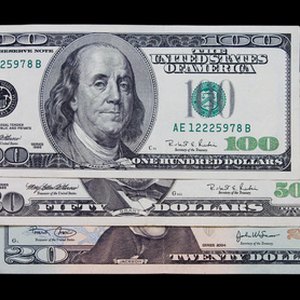
Once you have a PayPal account, you can invest in the PayPal Money Market Fund. Although investing in the fund involves some risk, financial experts from Barclay's manage the investment, according to PayPal. If you keep a balance in your account, that money will earn a return and still remain accessible for purchases or withdrawals.
Features
PayPal makes the fund convenient for PayPal members. Enroll in the PayPal Money Market Fund online by clicking on the link to "PayPal Money Market Fund" in Resources and then clicking on the orange "Enroll" button. After your enrollment, any money you deposit to your PayPal account will automatically go into the fund each day and earn a return. Any money you withdraw from PayPal will come out of the fund daily as well. You can still access your balance with your PayPal debit card, similar to a regular PayPal account and with the same limits.
The Fund's Investments and Fees
According the the Prospectus, the fund invests in a "Master Portfolio" that buys various high quality, short-term U.S. and foreign money market instruments, such as certificates of deposit and U.S. government and U.S. government agency obligations. Risks to your money include management risk, interest-rate risk and credit risk, among others. The fund strives to keep the share price at $1.00 U.S. Although the fund incurs operating expenses, fund investors pay no fees or load.
Tax Consequences
You will generally have to pay taxes on your distributions. If PayPal declares part of your dividends capital gains, you must pay their taxes as long-term capital gains. You may also have a capital loss or gain for tax purposes if you sell or trade shares.The fund will report dividends to you on a 1099-DIV form each year you receive $10.00 or more. PayPal will also state which dividends count as income and which as capital gains, if applicable. The IRS can require PayPal to withhold 28 percent of your taxable distributions if you have not complied with all federal tax regulations.
Performance
The fund's prospectus dated April 30, 2010, details performance for the calendar years 2000 through 2009. The year 2000 shows the highest return of 5.56 percent, while 2009 shows the lowest return, 0.23 percent. The yield can change quarterly or even more often. You will find the current yield on the money fund enrollment page.
Warning
Do not confuse this fund with a bank money market deposit account. PayPal states that the money market fund does not carry FDIC insurance. In fact, money that you leave in your regular PayPal account does not fall under FDIC insurance or regulation, either. CNN Money explains that PayPal operates as a deposit broker, not as a bank, even though many of its functions appear bank-like.
References
- CNN Money: What PayPal Does with Your Money
- PayPal. "Data Encryption." Accessed Feb. 11, 2020.
- PayPal. "PayPal Bug Bounty Program." Accessed Feb. 11, 2020.
- FTC. "How to Recognize and Avoid Phishing Scams." Accessed Feb. 11, 2020.
- FTC. "Tips for Using Public Wi-Fi Networks." Accessed Feb. 11, 2020.
- Evergreen National Bank. "Fraud Prevention." Accessed Feb. 11, 2020.
- Consumer Financial Protection Bureau. "Fraud and Scams Key Terms." Accessed Feb. 11, 2020.
- PayPal. "Resolving Disputes, Claims, and Chargebacks." Accessed Feb. 11, 2020.
- Federal Trade Commission. "FTC Advises Consumers Not to Use Wire Transfers for Online Purchases." Accessed Feb. 11, 2020.
- PayPal. "How Seller Protection Can Help Support Your Business." Accessed Feb. 11, 2020.
- PayPal. "What Is FDIC Insurance and How Does It Work?" Accessed Feb. 11, 2020.
- FDIC. "Prepaid Cards and Deposit Insurance Coverage." Accessed Feb. 11, 2020.

